This is the third post about the life of Susan Richardson Abbott. You can read earlier parts of Susan Abbott’s story at these links.:
Susan Richardson Abbott – Part 1 – 1829-1866
Susan Richardson Abbott – Part 2 – 1867-1909
In 1890 Susan Richardson Abbott received a widow’s pension because of her husband Randolph Abbott’s service with the United States Colored Troops during the United States Civil War. In the file were several statements by her then employer, Judge Crovatt and several former neighbors.
In 1903 she applied for an increase in her pension from $8 to $12 a month. In the deposition below she gives an overview of her life.
Click on any of the images to enlarge them.
DEPOSITION
Case of Susan Abbott ctf No. 416397 On this 4th day of August 1903 at Brunswick County of Glynn State of Ga before me, Don McClain a special examiner of the Bureau of pensions, personally appeared Susan Abbott who being by me first duly sworn to answer truly all interrogatories propounded to her during this special examination of aforesaid claim for pension, deposes and says: I am (blank) years of age; my post-office address is as above. I am a house servant.
I am the widow of Randolph Abbott, on account of whose service in the U.S army during the War of the Rebellion and subsequent death, I get a pension of $8 a month under the Act of June 27, 1890.
I can’t give my age. I had seven children when Charleston was taken. (She appears at least 65 years of age)
I was born in Charleston, S.C., the slave of Mr. Moon.1 He sold me to Ga. and I was the slave of Capt. Myers when freedom came. I can’t locate any of my white people now.
I married Randolph in slavery. I lived with him until he went in the war. We lived together about five years after the war when he died on St. Simon Island, Ga. I have not remarried since his death.
I have lived here with this family about 25 years
My husband was 6 feet tall and black. My claim was not examined before it was granted.
My husband served under Strawbridge and Capt. Walker.2 They are the men he went away with. He was never called by any name except Randolph Abbott. He was the son of Tom Abbott.
I came down here long before the war. I met my husband here. He was born on St. Simon Island. He has a brother in Savannah. I mean a half brother. He is called Washington. I can’t give the other name.
I own no property at all. I have no income but my pension and what I cook for.
My husband died about five years after the war of a visur (?) in the throat. Dr. Wilson, dead, attended him in his last illness. He did not get a pension. He was never well after the war.
This is the only pension I ever applied for. I have not put in under the old law. I have no claim pending before the Pension Office at the present time.
Since the death of my husband I have lived no place except here in Brunswick.
I have forgotten the names of my original witnesses. Judge Crovatt is the only lawyer I had. I live with him. He charged me nothing. I keep my pension papers at the office of Judge Crovatt. I have never pledged them or either of them for money or thing of value. I do not go down town on signing day Judge Crovatt does that for me. He brings me $24 every time and puts it into my hand.
I have heard my answers and they are correct.
Susan (her X mark) Abbott
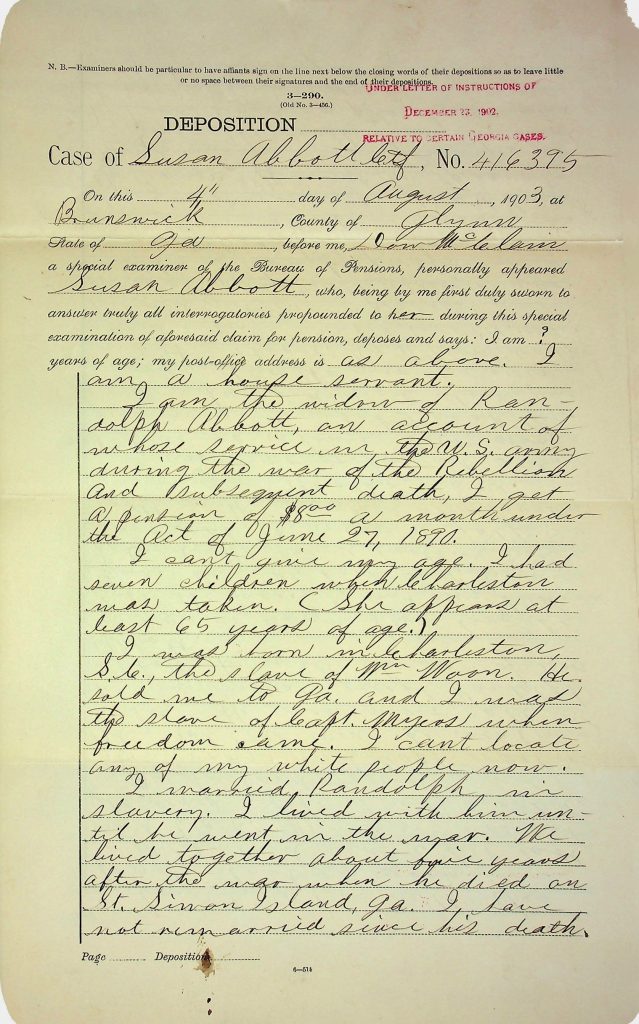
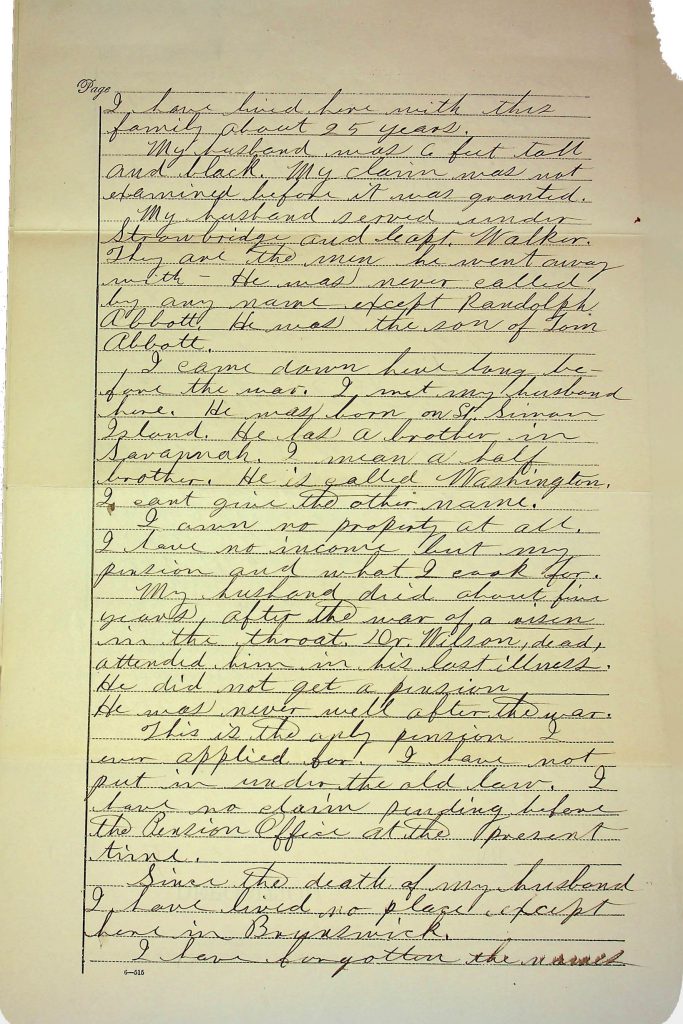
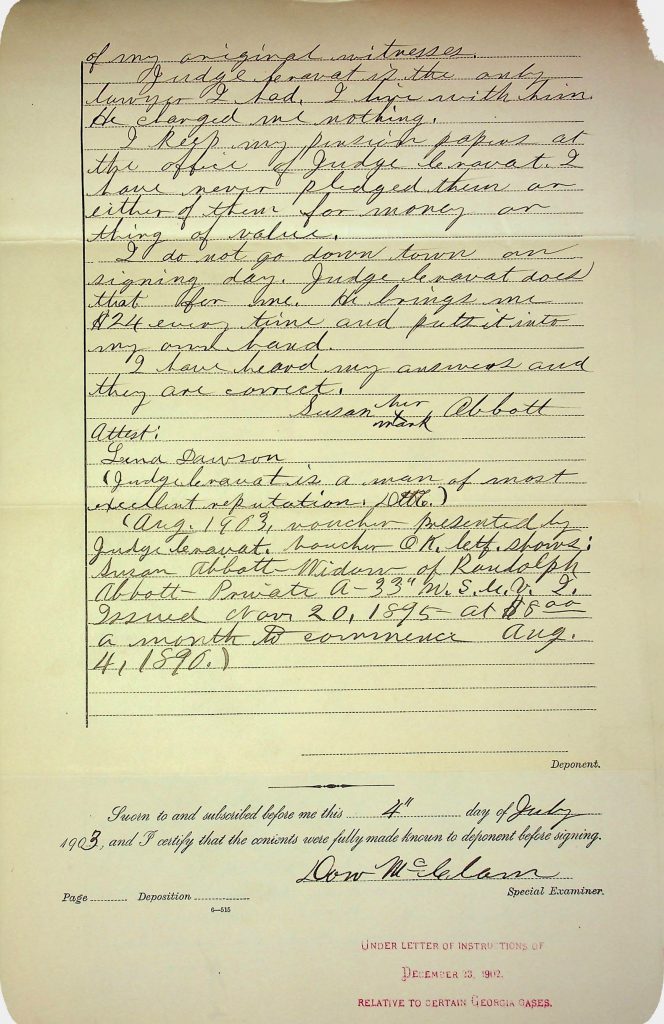
****
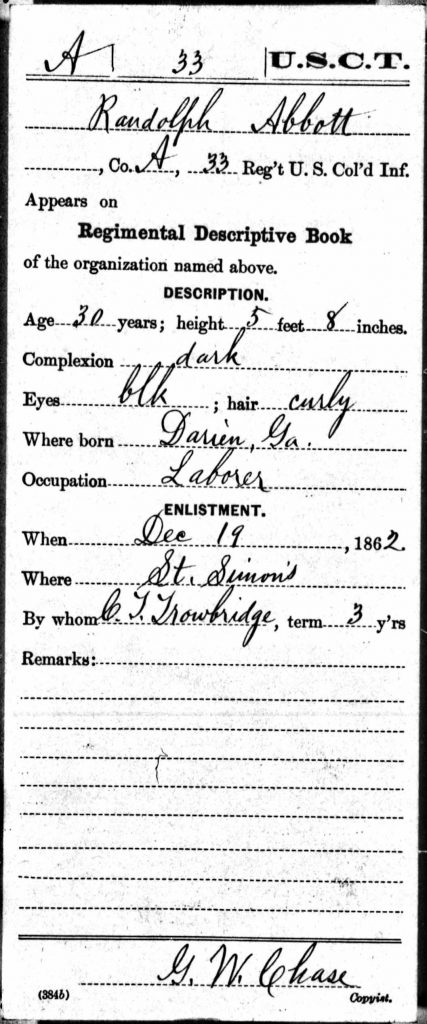
The description below of life on St. Simons Island during the Civil War was taken From Reminiscences, of My Life in Camp by Susie King Taylor. page 16. Susie King was an African American teacher, nurse and laundress who served during the Civil War and St. Simons Island and the mainland.
The latter part of August, 1862, Captain C. T. Trowbridge, with his brother John and Lieutenant Walker, came to St. Simon’s Island from Hilton Head, by order of General Hunter, to get all the men possible to finish filling his regiment which he had organized in March, 1962. He had heard of the skirmish on this island, and was very much pleased at the bravery shown by these men. He found me at Gaston Bluff teaching my little school, and was muh interested in it. When I knew him better I found him to be a thorough gentleman and a staunch friend to my race.
Captain Trowbridge remained with us until October, when the order was received to evacuate, and so we boarded the Ben-De-Ford, a transport, for Beaufort, S. C. When we arrived in Beaufort, Captain Trowbridge and the men he had enlisted went to camp at Old Fort, which they named “Camp Saxton,” I was enrolled as laundress.
The first suits worn by the boys were red coats and pants, which they disliked very much, for, they said, “The rebels see us, miles away.”
The first colored troops did not receive any pay for eighteen months, and the men had to depend wholly on what they received from the commissary, established by General Saxton. A great many of these men had large families, and as they had no money to give them , their wives were obliged to support themselves and children by washing for the officers of the gunboats and the soldiers, and making cakes and pies which they sold to the boys in camp. Finally, in 1863, the government decided to give them half pay , but the men would not accept this . They wanted “ full pay ” or nothing. They preferred rather to give their services to the state , which they did until 1864, when the government granted them full pay , with all the back pay due.
- Almost two hundred years ago Susan Richardson Abbot was born into slavery on the plantation of Thomas Boone in Charleston, SC. After Boone died 28 October, 1831, his wife began selling off land and people. https://findingeliza.com/archives/34332 [↩]
- He served under Trowbridge https://findingeliza.com/wp-content/uploads/2021/06/1962-Dec-19-enlisted-scaled.jpg [↩]
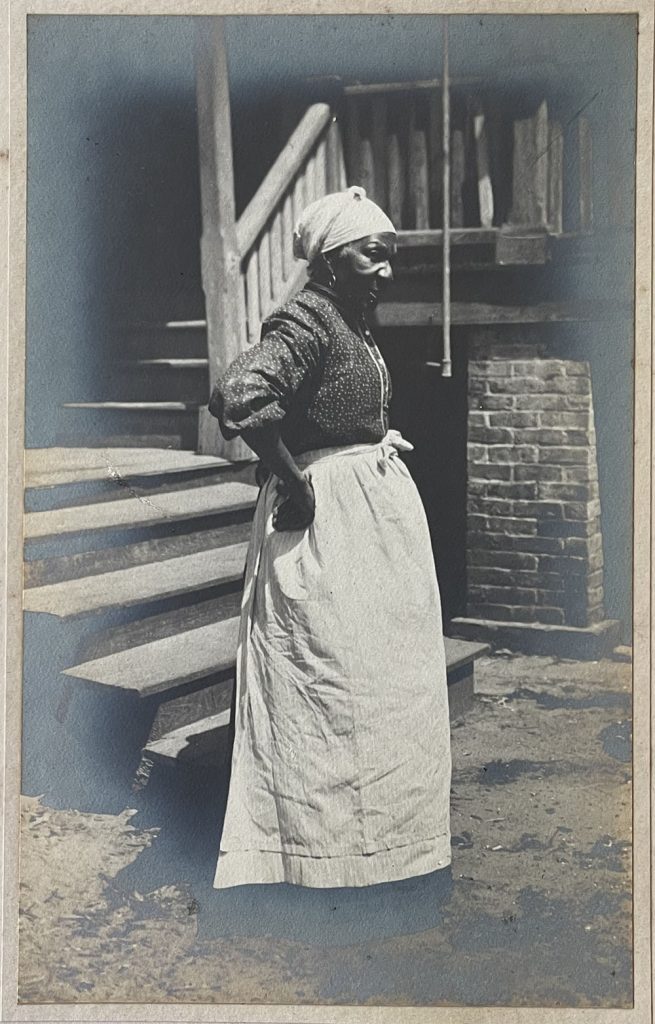

Great to hear details of her life, and that of her husband. The Civil War certainly tossed everyone up in the south!
A war will do that.
I was glad to see that my findings matched her memories, with a few minor names that she remembered a bit differently.